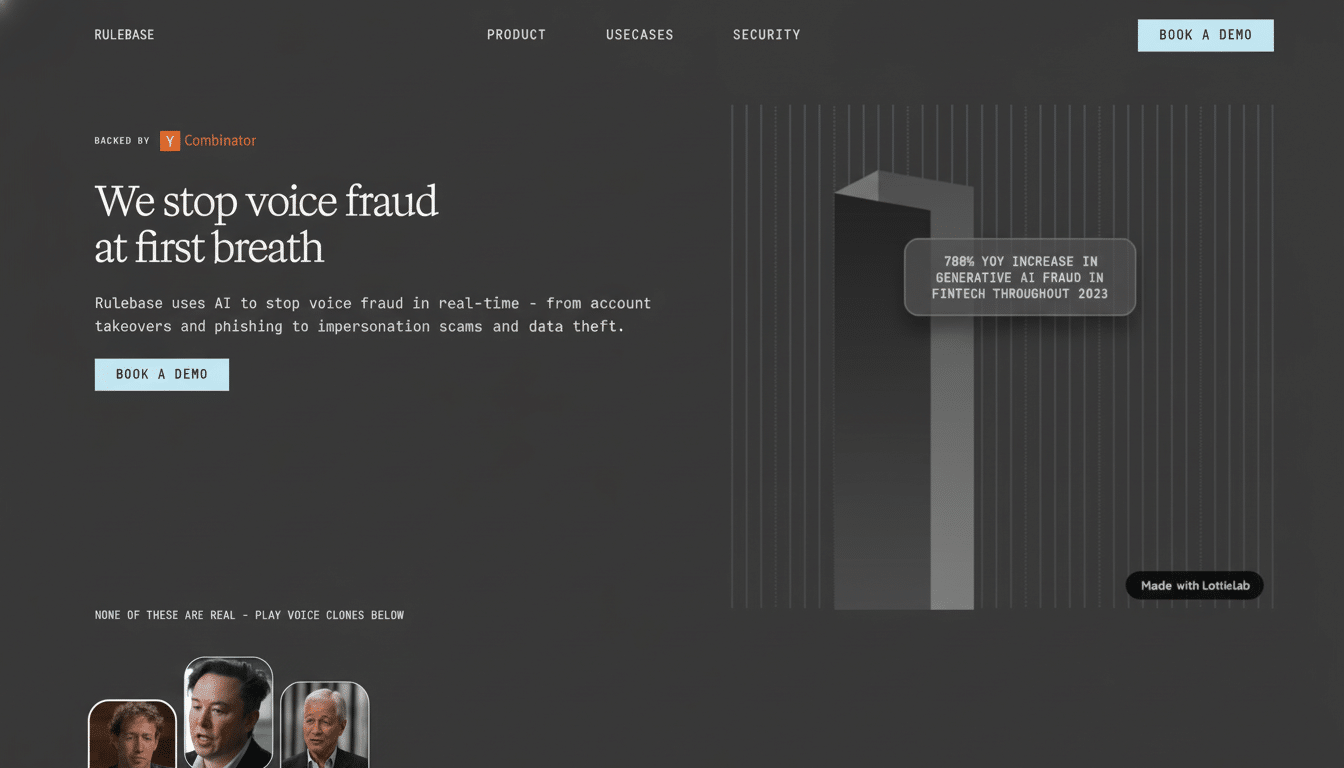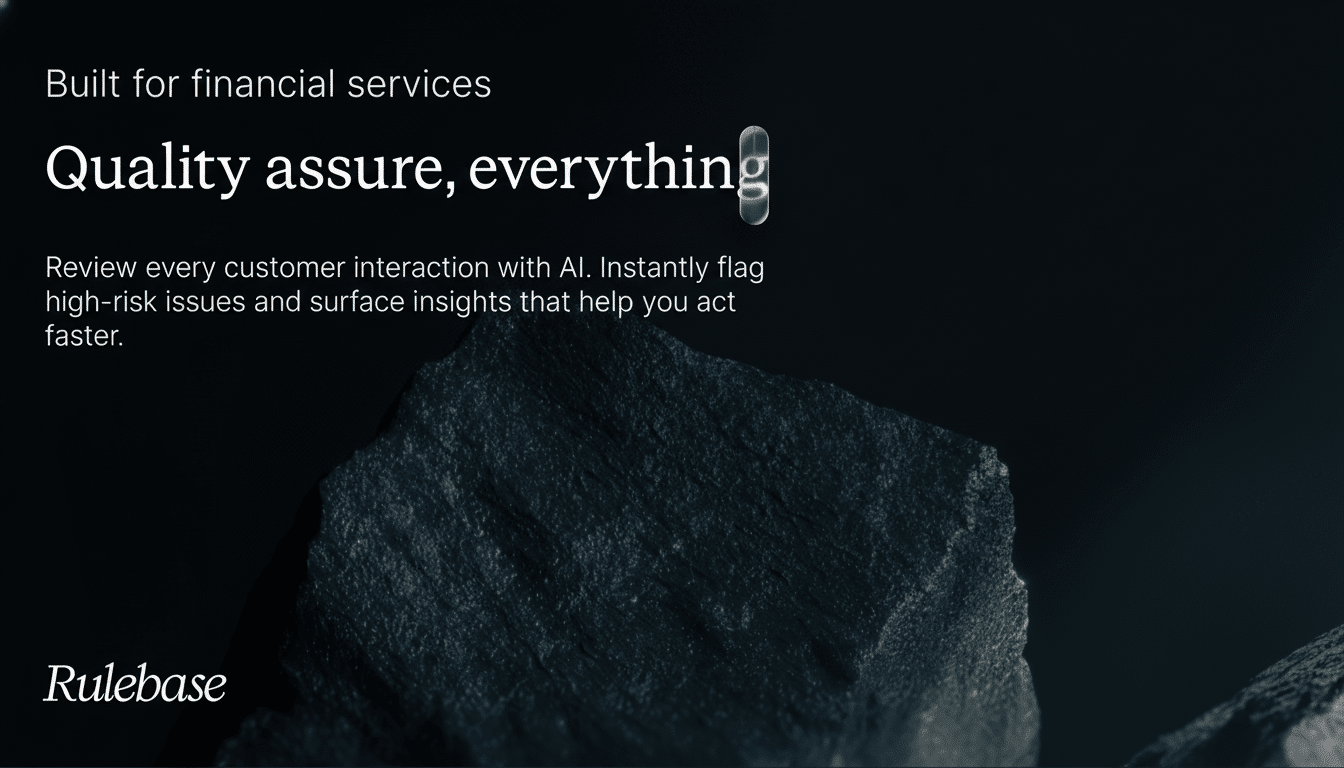Y Combinator-backed Rulebase is betting that the biggest AI return in financial services isn’t in chatbot-like solutions, but in tendrils of soft-spoken automation for back-office administration. The London-based startup, founded by engineers Gideon Ebose and Chidi Williams, has raised a $2.1 million pre-seed round led by Bowery Capital with participation from Y Combinator, Commerce Ventures, Transpose Platform VC and several angels — cash that will be used to scale an “agent coworker” that is pitched as being built for regulated fintech operations.
An AI colleague focused on the unsexy back-office work
Financial institutions burn an increasingly large number of hours on support ticket QA, dispute resolution, and compliance reviews. Rulebase inserts a bot inside those workflows, where it can observe customer interactions, flag policy or regulatory risks and prompt follow-ups across tools as varied as Zendesk, Jira and Slack. Importantly, it preserves human-in-the-loop controls, a must for any finance client, with visible handoffs and authorizations.
- An AI colleague focused on the unsexy back-office work
- Early traction with quantifiable impact for clients
- Why fintech first: compliance-grade accuracy
- Inside the workflow: QA to disputes and resolution steps
- Go-to-market strategy and the startup’s global posture
- The broader future of AI in financial ops

The wedge is quality assurance. Legacy teams hand-sample 3-5% of support conversations to verify disclosures, authentication events, and timelines. Rulebase evaluates 100% of interactions. The company claims it can reduce costs by up to 70% through this transition from spot-checking to continuous review, surfacing patterns of risk sooner.
Early traction with quantifiable impact for clients
Rulebase is now already live with clients that include U.S. business banking platform Rho and a Fortune 50 financial institution. At Rho, a 30% decrease in escalations is what the startup claims it has seen after implementing its QA workflows; proof positive that proactive detection and templates around remediation can duct-tape downstream volumes of disputes and chargebacks.
The company’s business model is usage based: customers pay by the interaction reviewed or workflow automated. Revenue has increased at a double-digit clip month over month since the founders joined the accelerator, according to them, a good sign in an enterprise category known for having long sales cycles. For buyers, the benefit is simple ROI: more coverage, less error and clearer audit trails without throwing people at the problem.
Why fintech first: compliance-grade accuracy
Unlike horizontal copilots, Rulebase is moving toward domain specificity. Its agents are optimized for compliance-grade tasks — imagine applying rules from Mastercard and Visa to networks, maintaining timelines required by regulators such as the CFPB or collecting evidence fit for an audit from the OCC and the FCA. That depth is the moat, as founder-CTO Williams frames it: models that solve not just to summarize and pass MCV but actively make procedurally correct decisions and bake them in.
The timing is favorable. Reports by industry professionals like Deloitte and McKinsey have provided insight into the rising costs of control activities and headcount overhead tied to manual QA. At the same time, regulators have intensified scrutiny over customer treatment, disclosures and record-keeping — perfect stomping grounds for agentic systems that can both execute every step and log it. Expectations also are evolving among buyers, who increasingly require functionality such as fine-grained permissions, immutable audit logs and simple export for examiners.

Inside the workflow: QA to disputes and resolution steps
Rulebase’s “Coworker” plugs into service desks and comms platforms to monitor an interaction end-to-end: it scores support calls or chats against internal and regulatory standards, alerts on deviations, opens Jira tasks with proposed fixes, alerts owners in Slack and tracks how Coworker was able to influence resolution. The data over time becomes training material for playbooks that are capable of auto-resolution on boilerplate steps, while humans make consentful and nuanced judgments.
The current focus is QA and dispute workflows; the roadmap will see assistance with fraud investigations, onward checking and reporting for regulatory purposes. If ambition turns into execution, the blueprint could be expanded to adjacent domains like claims operations in insurance which are also dominated by rule-bound processes.
Go-to-market strategy and the startup’s global posture
The company is initially targeting commercial banks, neobanks and card issuers in the U.S., Europe and Africa — areas where digital volume can be steep but operational complexity escalates even faster. The founders, who previously built products including Buzz, an open-source speech-to-text project with tens of thousands of developers and substantial community adoption, say their strategy is unapologetically global: build once for the hardest regulatory environments and then localize rulesets and workflows per region.
Competition lies on a number of fronts — QA analytics vendors to various workflow automation suites as well as fraud and disputes platforms. Rulebase’s bet is that a Rails app that takes an agentic layer seriously and builds it as being for regulated work will win out over generic copilots or static QA dashboards by finally doing more than documenting the loop (detect, document, drive): fix it.
The broader future of AI in financial ops
The story about AI in finance has evolved from customer-facing chat. The new frontier is the messy and high-stakes middle office where mistakes are costly and regulators demand perfection. If Rulebase can keep showing that agents can provide full-coverage QA, mean fewer escalations and have defensible auditability, it has a real shot at becoming the default “AI coworker” for fintech — right where the automation payoffs are most lucrative.

